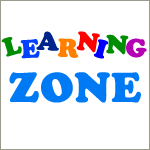At Saxton school, we are committed to promoting a love of language and literature through high quality daily English teaching, which encompasses speaking, listening, reading and writing. Our English teaching is firmly embedded into the wider curriculum and is evident in all subjects across all classes throughout the school.
We are keen to promote good listening skills and the confidence to speak with confidence in a variety of situations from an early age as these communication skills are the foundations for forming healthy relationships as well as being important vehicles for developing language skills and acquiring knowledge across all areas of the curriculum. There is no better example of the children’s speaking and listening skills in action than during our weekly ‘reflection times’ when children are asked to deliver presentations to their class based on a topic close to their hearts.
At Saxton, we understand the importance of delivering high quality phonics teaching from the very beginning so that children quickly develop the skills they need to become emerging readers and writers. Our practitioners follow the teaching sequence suggested in the “Sounds Write” programme and homework packs for parents include words and spellings linked to their child’s phase of development so that parents can support their children at home. Even our youngest children are keen to pick up books and apply their phonics knowledge to reading or to mark make in the areas of provision around the classroom.
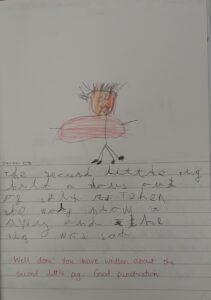
As the children progress through the school, they are taught vital word recognition strategies that allow them to read fluently, freeing them up to concentrate on the meaning of the text. All children have access to a wide range of both fiction and non-fiction books at an appropriate level for their reading ability. This range may include reading scheme books that are designed to develop reading skills but also a large collection of ‘real’ books from many great children’s authors. All children are exposed to narrative, poetry, non-fiction texts every half term as well as playscripts, newspaper reports and a wide range of other genres. In Key Stage 2, we suggest a fantastic range of much-loved stories including both the latest releases as well as children’s classics that our children are eager to work their way through. Books are shared in a variety of ways from being read aloud to the whole class to curling up in a cosy reading corner and escaping to another place! It is our aim that every child should read something every single day. The children are also encouraged to visit local libraries and to take part in the summer reading challenges that they hold each year. As a consequence of these reading initiatives, we are proud that our children develop a habit of reading widely both for pleasure and as a source of information.
You can see guidance on how to help your child at home here: parents-little-guide and 7_Top_Tips_to_Support_Reading_at_Home
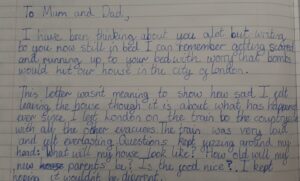
In order to measure and promote a good understanding of books, we use a program called Accelerated Reading, which quizzes the children about their knowledge and understanding of the texts that they have read. Success on accelerated reading not only results in an improved reading age but also a certificate in assembly as acknowledgement of their success.
We are always keen to develop spelling across school and in addition to regular practise of phonics rules and spelling patterns in class, we organise an annual Spelling Bee, which focuses on spelling high frequency words and words from the statutory spelling lists that all children should know how to spell before the end of Years 4 and 6. To support the children with learning spellings, they are given weekly lists to practise at home as well having access to an online system called ‘Spelling Frame’, which offers a very visual way of learning spellings that our children enjoy using. The children practise spellings in a wide range of situations and love to take part in the one-minute whiteboard challenge to write a new word as many times as you can in a minute! This helps to develop muscle memory as well as visual memory for the correct spelling.
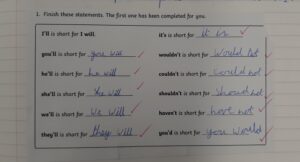
To encourage a love of writing across school, we encourage the children to write for a purpose. For example, in the past, the children have written letters to former pupil and Under 20s England Football Captain, Lewis Cook, to try to persuade him to visit… letters which were successful! As much as possible, English lessons are planned to link to the current topic that the class is studying so, for example, if the topic is Ancient Greece, they may be asked to write their own myths based on some of the myths shared in class or if the topic is the heart and circulation, they may be asked to write a non-chronological report on this subject matter. In this way, the children are given the opportunity to expand their knowledge and understanding of a wide range of curriculum topics whilst simultaneously developing their written work.
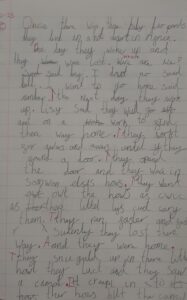
You can find out more about how to help your child with writing in our Parents Guide
We are always keen to develop links with children’s authors and in recent years have enjoyed visits from the well- known children’s poet, Paul Cookson and the author of the Fabulous Four Fish Fingers, Jason Beresford. Some of our older children also attend writing workshops three times throughout the year along with other children from our alliance of schools. They often come back full of exciting writing ideas to share with the rest of the class!
As a school, we teach a cursive script in handwriting and we are proud that visitors to our school often comment on this beautiful handwriting style in our books and on displays. The children are taught the importance of seating position and pencil grip and are encouraged to remember mantras such as ‘BBC’ (‘bottoms back in chairs’), TNT (‘tummy near table’) as well as strategies for joining such as ‘flick to the North-East’. We believe it is important that children take pride in the presentation of their work and that it promotes quality content as well as a beautiful appearance.
We have high expectations of our pupils in English and are proud of the excellent KS1 and KS2 results that we have achieved in recent years. We track pupil progress in all aspects of English on a termly basis and tailor our teaching to the needs of individuals, offering 1-1 or small group intervention packages as required. In this way, we hope that every child can reach their fullest potential in English and across the wider curriculum.

